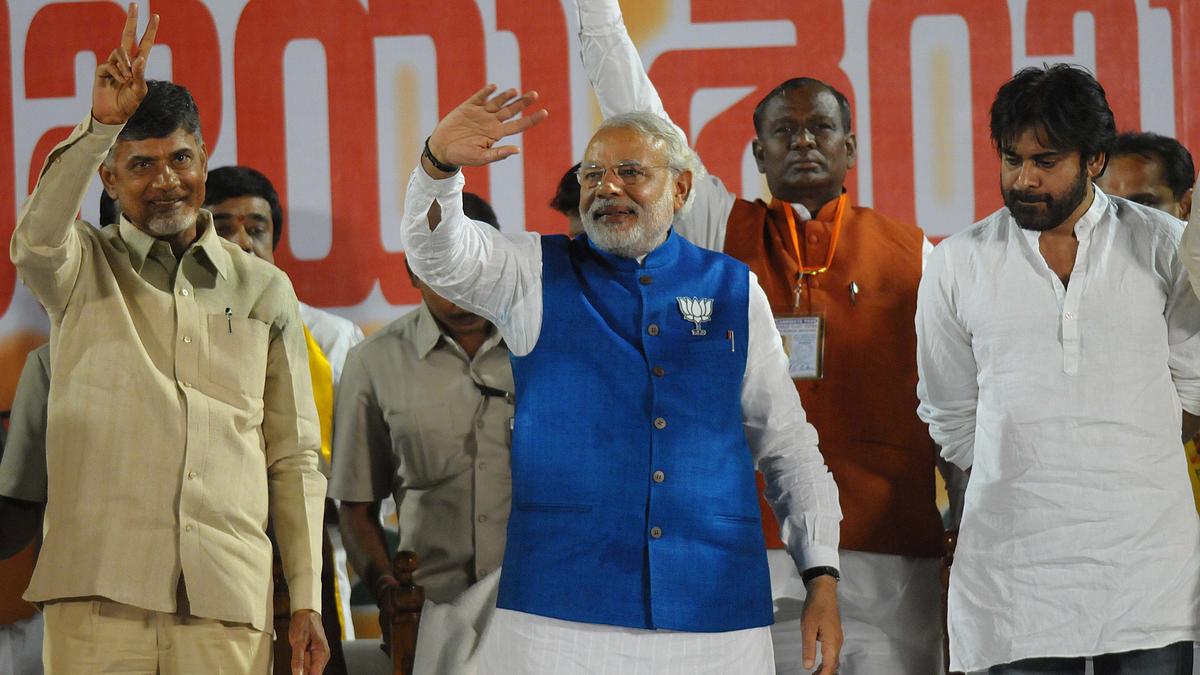
CSDS-Lokniti post-poll survey: A successful social alliance in Andhra Pradesh Premium
The Hindu
CSDS-Lokniti post-poll survey: Leadership of Narendra Modi, strategies of Chandrababu Naidu and Pawan Kayan, and the support of Backward Classes and Kapus contributed to the BJP-TDP-Jana Sena alliance’s win in Andhra Pradesh
The alliance of the Telugu Desam Party (TDP), the Bharatiya Janata Party (BJP), and the Jana Sena Party (JSP) won the elections in Andhra Pradesh. The leadership of Prime Minister Narendra Modi, the strategies of TDP chief Chandrababu Naidu and actor-turned politician Pawan Kayan, and the overwhelming support of the Backward Classes (BCs) and Kapus contributed to this win. The alliance won 21 Lok Sabha seats and 164 Assembly seats. The Yuvajana Sramika Rythu Congress Party (YSRCP) of Jagan Mohan Reddy has been reduced to 11 seats in the Assembly and 4 seats in the Lok Sabha.
The social profile of the voters of the TDP allies and YSRCP is given in Table 1. The table shows that the TDP allies have got more than 60% of the vote share of the Gouds, Kammas, and Kapus; more than 50% of the vote share of Other BCs, Madigas, and Malas; and more than 30% of the vote share of the Christians, Muslims, the Reddy community, and upper castes. More than 50% of the Reddy community, Christians, upper castes, and Muslims voted for the YSRCP. More than 40% of the Malas, Other Scheduled Castes, Yadavs, and Madigas voted for the party, as did more than 30% of the other BCs, and more than 20% of the Kapus, Scheduled Tribes, and Gouds.
From the class point of view, four of the 10 of the poor, more than half of the lower middle class and middle class, and over six of every 10 of the rich voted for the TDP and its allies. In terms of age groups, the TDP alliance won more than half the votes of those below 25 and close to two-thirds of the votes of those in the 26-35 age group. More than half the voters in the older age group supported the TDP-led alliance. The TDP alliance performed better among men than women. It performed equally well in urban and rural areas.
E. Venkatesu is Professor of Political Science, University of Hyderabad

“Writing, in general, is a very solitary process,” says Yauvanika Chopra, Associate Director at The New India Foundation (NIF), which, earlier this year, announced the 12th edition of its NIF Book Fellowships for research and scholarship about Indian history after Independence. While authors, in general, are built for it, it can still get very lonely, says Chopra, pointing out that the fellowship’s community support is as valuable as the monetary benefits it offers. “There is a solid community of NIF fellows, trustees, language experts, jury members, all of whom are incredibly competent,” she says. “They really help make authors feel supported from manuscript to publication, so you never feel like you’re struggling through isolation.”

Several principals of government and private schools in Delhi on Tuesday said the Directorate of Education (DoE) circular from a day earlier, directing schools to conduct classes in ‘hybrid’ mode, had caused confusion regarding day-to-day operations as they did not know how many students would return to school from Wednesday and how would teachers instruct in two modes — online and in person — at once. The DoE circular on Monday had also stated that the option to “exercise online mode of education, wherever available, shall vest with the students and their guardians”. Several schoolteachers also expressed confusion regarding the DoE order. A government schoolteacher said he was unsure of how to cope with the resumption of physical classes, given that the order directing government offices to ensure that 50% of the employees work from home is still in place. On Monday, the Commission for Air Quality Management in the National Capital Region and Adjoining Areas (CAQM) had, on the orders of the Supreme Court, directed schools in Delhi-NCR to shift classes to the hybrid mode, following which the DoE had issued the circular. The court had urged the Centre’s pollution watchdog to consider restarting physical classes due to many students missing out on the mid-day meals and lacking the necessary means to attend classes online. The CAQM had, on November 20, asked schools in Delhi-NCR to shift to the online mode of teaching.









